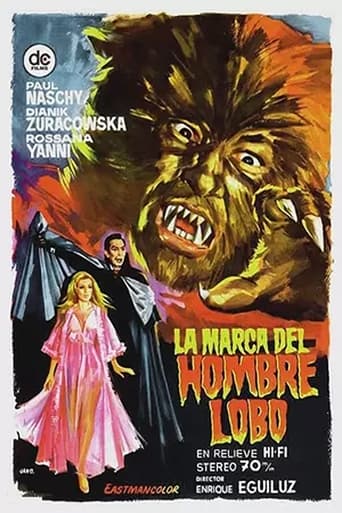



Some things I liked some I did not.
Clever and entertaining enough to recommend even to members of the 1%
View MoreWhile it is a pity that the story wasn't told with more visual finesse, this is trivial compared to our real-world problems. It takes a good movie to put that into perspective.
View MoreThere are moments that feel comical, some horrific, and some downright inspiring but the tonal shifts hardly matter as the end results come to a film that's perfect for this time.
View More1968's "Las Noches del Hombre Lobo" (The Nights of the Werewolf) remained a frustratingly elusive title during Paul Naschy's illustrious lifetime, either uncompleted or simply unreleased, shot on location in Paris by director Rene Govar (his only credit), who apparently died during filming. Only the second outing for hirsute Waldemar Daninsky, who catapulted Naschy to stardom with the previous year's "La Marca del Hombre Lobo," and scripted by Naschy under his real name Jacinto Molina, in collaboration with director Govar and C. Bellard (like Govar, no other credits). Of the four actors listed on IMDb (Peter Beaumont, Monique Brainville, Helene Vatelle), only Beba Novak had any other credits, Naschy's own "El Vertigo del Crimen," and Freddie Francis' German comedy "Gebissen Wird nur Nachts" aka "The Vampire Happening." Storywise it's a plot that Naschy would return to quite often, a mad scientist exploiting Wolf Man Waldemar for his own nefarious reasons, popping up in the next Daninsky title, "Assignment Terror," in which Michael Rennie's scientist is revealed to be from another planet, or "Dr. Jekyll and the Werewolf," with Jack Taylor's Jekyll using his Hyde formula on the already cursed Daninsky, or "The Fury of the Wolf Man," which made the mad scientist a beautiful woman (Perla Cristal). Considering that he repeated the same role in a dozen features, "Las Noches del Hombre Lobo" could very well be no great loss but coming so soon in his starring career, we can only speculate at such a late date. The third Daninsky title, "Assignment Terror," threw in every conceivable monster in existence, solidifying Naschy's hold on the crown for King of Spanish horror, but the next one that followed, "La Noche de Walpurgis," became an undisputed international sensation.
View More